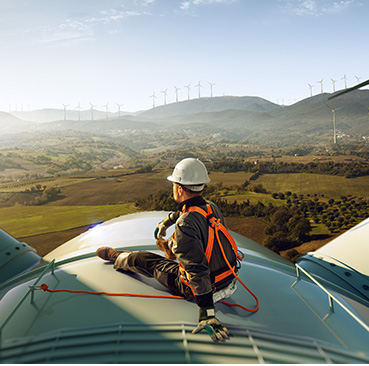Innovation, Research and Development
Innovation, integrated with Research and Development, is a strategic pillar for promoting sustainable growth and the energy transition, reinforcing Copel’s position as a protagonist in the transformation of the electricity sector. The company’s strategy, consolidated with the support of new structures and processes, articulates initiatives that range from strengthening the culture of innovation to investments in technological solutions that generate value for all stakeholders.
As part of this integrated model, the corporate innovation environment is being systematically improved, with the inclusion of the topic in the Strategic Reference, the creation of the Investment and Innovation Committee – made up of specialized members – and the definition of theses aimed at innovation and investments, aligned with the regulatory criteria of the PDI – Research, Development and Innovation Program of the National Electric Energy Agency (Aneel).
In addition, innovation actions extend to the development of new products and services aimed at the energy transition, evidenced by emblematic initiatives such as:
- The consolidation of the open innovation program, which fosters collaboration with startups and strategic partners and even earned Copel recognition as a standout company in the Conecta Startup Brasil program.
- The launch of Copel Ventures I, the company’s first Corporate Venture Capital fund, with R$150 million committed to boosting startups in the Seed and Series A stages, aimed at developing solutions that meet the demands of the market and the energy transition.
- Projects aligned with the Sustainable Development Goals (SDGs) and ESG criteria, which reinforce social and environmental responsibility and the commitment to neutralizing carbon emissions by 2030, for example by modernizing the company’s own fleet.
Innovation
Innovation is a core value in Copel’s strategic framework, serving as one of the pillars for sustainable growth, process improvement and customer loyalty. In a dynamic and competitive environment, the search for innovative solutions is no longer the exclusive responsibility of the Research, Development and Innovation (“PDI”) areas regulated by Aneel, but has become a transversal demand throughout the company.

Research and Development
Since its inception, Copel’s Research and Development Program (PDI) has directed investments towards scientific and technological research projects that generate results for practical application. Guided by Aneel’s criteria, this program drives the improvement of products, processes, methodologies and techniques, contributing to the creation of solutions that promote operational efficiency, innovation and competitiveness, and which are essential for the consolidation of a sustainable energy matrix.

Innovation, Research and Development - Environmental Dimension
At Copel, the pursuit of excellence in environmental performance translates into an ongoing commitment to innovation, research, and the development of solutions that make the expansion and operation of its projects increasingly sustainable. In line with ESG best practices, the Company invests in projects that minimize environmental impacts, optimize the use of natural resources, and promote energy efficiency.
Innovative Projects in Action
Copel has developed and implemented a series of projects that exemplify its commitment to innovation and sustainability. These projects range from the protection of aquatic fauna to the transformation of waste into clean energy, demonstrating the breadth and depth of the impact of innovation on the environment.
Protection of Aquatic Fauna
- Electric Barrier for Fish at the Colíder Hydroelectric Plant: Copel GeT installed electric barriers in the hydraulic circuit of the Colíder Hydroelectric Plant, minimizing risks to fish and ensuring safety during turbine maintenance maneuvers. This innovative technology prevents most fish from entering the hydraulic circuit, making maintenance actions safer for the animals.
- Fish Transposition System (STP) at the Colíder Hydroelectric Plant: The STP at the Colíder Hydroelectric Plant, one of the largest fish ladders in the world, was designed to allow a wide variety of fish species to cross the dam, ensuring gene flow between populations downstream and upstream of the structure. Fish using the FTS are monitored through visual observation and PIT-TAG marking, allowing migration to be tracked and the system’s effectiveness to be assessed.
- Deflector at the Colíder HPP Spillway: To mitigate the effects of dissolved gas supersaturation (TDG) in the water, Copel GeT built a deflector block at the Colíder Plant spillway, reducing gas dissolution in the water and minimizing risks to aquatic fauna. The computational modeling methodology developed to simulate the process of air bubble transport in water contributes to the design of future plants, especially in the Amazon basin.
Transforming Waste into Clean Energy
- Technology for Low-Carbon Hydrogen Production: Copel is developing an innovative project to transform organic waste into clean energy, making hydrogen production more efficient and sustainable. The process uses a biodigester to convert organic waste into biogas, which is then transformed into hydrogen through an efficient process. This hydrogen can be used to generate electricity or to manufacture products such as ammonia and urea, which are widely used in agriculture.
Asset Optimization and Monitoring
- Vegetable Oil in Transformers: Copel has developed a model that improves the useful life and prevents the degradation of the insulating paper that makes up the transformer. To validate this project, a 230kV Prototype Unit was built at the GPS plant in Antonina, equipped with fiber optic monitoring for continuous analysis of insulator degradation. In addition, the project identified dissolved gases as a maintenance tool for equipment insulated with vegetable oil.
Water Quality
- Rapid water quality test kit: Copel currently assesses the water quality of its reservoirs through specialized laboratories, and obtaining these results can take up to 15 days depending on the toxin found. Prioritizing a more practical analysis of water quality, Copel has been developing a product similar to a “glucometer” that would identify water pollutants using just one drop, without relying on more complex logistics for this diagnosis.
Open Innovation Solutions
- In addition to RDI projects, Copel has sought innovative solutions through open innovation programs, such as Conecta Startup Brasil. In partnership with startups, the Company has developed technologies for environmental monitoring, through which the startup Siapesq developed PhytoBloom Vision, a system for monitoring and predicting the proliferation of aquatic plants in reservoirs, using satellite images and artificial intelligence. This solution allows for more efficient management of water resources, contributing to the preservation of biodiversity and ensuring water quality.
These projects demonstrate Copel’s commitment to sustainability and environmental preservation. By investing in innovation and technology, the Company seeks solutions that minimize the environmental impacts of its operations and contribute to a cleaner and more efficient future.
Innovation, Research and Development - Social Dimension
At Copel, innovation and technological development are not limited to operational efficiency and environmental responsibility; the social dimension is a fundamental pillar in all initiatives. The Company seeks to ensure that new technologies, products, and processes generate a positive and lasting impact on society, promoting inclusion, accessibility, improved quality of life, and the creation of opportunities.
Projects with Social Impact
Copel has invested in projects that demonstrate its commitment to the social dimension of innovation:
- Copel Hackathon: By bringing together students from various universities to develop innovative solutions to challenges in the electricity sector, Copel encourages creativity, entrepreneurship, and the training of new talent, promoting social inclusion and the development of skills for the future of work. The Hackathon also encourages connections between Copel and new talent, promoting digital transformation and the development of solutions for a more efficient and sustainable electricity sector.
- Smart Grids: The implementation of smart meters not only optimizes energy consumption but also facilitates access to differentiated rates and energy efficiency programs for low-income families, promoting social inclusion and reducing inequality. In addition, the implementation of smart grids contributes to the reduction of CO₂ emissions, which positively impacts the quality of life of communities.
Copel has also sought innovative solutions through open innovation programs, such as Copel Volt, and in partnerships with startups.
- The startup Porang, for example, has developed a telemetry solution that allows monitoring and alerting communities in remote areas with low internet access and greater reach, increasing dam safety and community well-being.
- Movimento Climático Repenso is an initiative to empower micro and small businesses to become agents of change in their communities. The Movimento Climático Repenso platform provides entrepreneurs with the tools and knowledge they need to calculate the impact of their businesses and adopt more sustainable practices, while creating opportunities to strengthen their ties with customers and society. By sponsoring access to the platform, Copel sought to encourage the adoption of low-carbon practices and promote awareness of the importance of sustainability, empowering entrepreneurs to become leaders in their communities and inspire others to follow the same path. The platform also offers access to training content and awareness campaigns that can be replicated to its consumers, expanding the reach of its social and environmental engagement strategy.
- Automation in Receiving Digital Payments: in this other proof of concept carried out through the Copel Volt open innovation program, Copel tested an automation system for receiving digital payments, with a focus on streamlining the collection of electricity bills via PIX for delinquent customers, promoting social inclusion. The solution sought to avoid power cuts for vulnerable families, ensuring continuity of supply and reducing the costs and inconvenience associated with dispatching teams.
Other Contributions to the Social Dimension
In addition to the projects highlighted, other Copel initiatives also generate positive social impacts:
- Innovation for Electromobility: By investing in charging infrastructure and partnerships with startups in the sector, Copel contributes to the advancement of electric mobility in the country, promoting economic and infrastructure development, as well as improving air quality in cities.
- Biomass Projects: Initiatives to transform organic waste into clean energy not only reduce dependence on fossil fuels, but also generate income for local communities and promote the circular economy.
Copel is committed to continuing to invest in projects that generate value for society, seeking innovative solutions to the social and environmental challenges of the electricity sector. The Company believes that by promoting inclusion, accessibility, and sustainability, it is building a better future for everyone.



